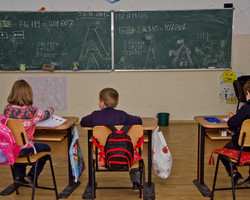Collaboration between health and education sectors helps improve vaccination coverage in Ukraine

WHO
Stopping the recent measles outbreak in Ukraine has required good coordination at all levels between the health and education sectors. Among other joint actions, verification of children’s immunization status through school-based records was initiated to identify children at risk and to inform immunization catch-up campaigns. In line with the Ministry of Health’s Workplan on Immunization for 2019–2021, of which WHO is a partner, WHO conducted a national workshop on 18–19 December 2019 to help make this verification approach a regular part of immunization practices.
School-based records are a more accurate source of information on the vaccination status of schoolchildren than health-care records, because not all children are registered in health facilities and those who missed their vaccinations may remain unrecognized by the health system. Schools also serve as platforms for immunization advocacy, reaching both children and parents with information about the importance and benefits of vaccination.
“Our joint work with the Ministry of Education, Public Health Centre and National Health Service is not only important for enhancing the immunization programme in the country but also to build trust in vaccination in society,” said Andrii Semyvolos, Deputy Minister of Health of Ukraine. “Talking to children about vaccine safety and the advantages of vaccination from an early age can help prevent the spread of misinformation in the future.”
Building on lessons learned to prevent future outbreaks
The workshop also focused on ways to adapt WHO regional recommendations on conducting microplanning of outreach immunization activities to the local context. Representatives of the Ministry of Health and Ministry of Education heard from various regional health and education departments about their experiences in conducting data verification and monitoring of outreach immunization activities.
Ukraine has significantly improved routine immunization coverage since 2016. However, despite steady progress, the target of 95% of children vaccinated against measles and other vaccine-preventable diseases has not yet been achieved. Promptly addressing the remaining gaps has been especially crucial in the context of the ongoing measles outbreak, which resulted in 57 000 reported cases in the country in 2019.
Overcoming challenges in reaching immunization coverage targets and ensuring every child is protected from vaccine-preventable diseases requires an intersectoral approach and community engagement, better information exchange between sectors, and tailoring programme delivery and communications to the perspectives of the community.
“We believe Ukraine’s example demonstrates the impact of intersectoral cooperation and can inspire other countries of the WHO European Region,” said Jarno Habicht, WHO Representative in Ukraine.



